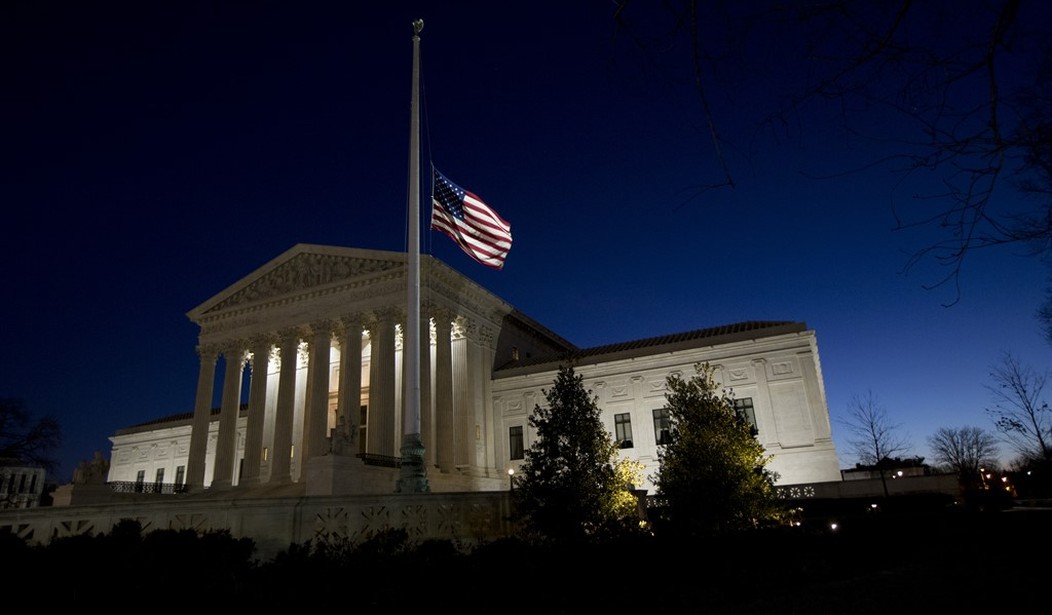The news of Supreme Court Justice Antonin Scalia's death cut like a dagger on Saturday, as admirers and adversaries alike were stunned by the sudden loss of a legal giant. Virtually everyone acknowledges his brilliance, his influence, and his impact on the Court. Virtually everyone sympathizes with his grieving family and loved ones. And virtually everyone began to consider the enormous consequences of his passing almost immediately: A High Court split 4-4. A vacancy that could alter SCOTUS' ideological composition for a generation. A divisive, lame duck president in his final year in office. A Republican-held Congress. A high-stakes, high-drama presidential election cycle well underway. What could, and
Advertisement
(1) Ample Precedent. As several GOP presidential candidates accurately noted at Saturday's debate, it has been more than eight decades since a Supreme Court vacancy arose and was filled in a presidential election year. There is plenty of precedent for denying Obama the opportunity to make such a consequential appointment on his way out the door; indeed, the Senate has seen fit on several occasions to allow SCOTUS vacancies to sit open for more than a year. Obama has the constitutional authority to name a nominee of his choosing. The Senate has the constitutional authority not to act on it, especially in light of the standard practice when it comes to election year openings.
Recommended
Advertisement
(2) Let the people vote. The American electorate is in the process of choosing the next president. Votes have already been cast, and the current Supreme Court term is already underway. The important next step of replacing Scalia can and must wait until the people have had their say. The direction of the Court hangs in the balance.
(3) The words and deeds of Senate Democrats. Let's begin with a few words from the minority party's current leadership team
Schumer in mid-*2007* (not yet an election year): We Democrats should not confirm another Bush SCOTUS appointee. pic.twitter.com/W0iiZRHvZ5
— Guy Benson (@guypbenson) February 15, 2016
Harry Reid in 2008 on climate for confirming judges: pic.twitter.com/574syvVv7v
— Guy Benson (@guypbenson) February 15, 2016
Schumer was laying the groundwork to obstruct any SCOTUS appointment that may have been advanced over the last 18 months of George W. Bush's presidency. Harry Reid emphasized that there's a long history of election years being deemed "very tough" environments in which to confirm federal judges -- let alone Supreme Court justices, when the prevailing judicial philosophy of the Court is at stake. Both Reid and Schumer are singing wildly different tunes today, for obvious reasons. They
Advertisement
(4) Elections have consequences. This refrain has been popular among Democrats during the Obama years; the president himself set the tone for this line of argument with his infamous "I won" remark early in his first term. It is true that Obama won back-to-back presidential elections. It is also true, in my opinion, that presidents ought to be afforded a wide berth to put their people in place. I even employed the "consequences" line in reluctantly opposing potential filibusters (that didn't materialize) against Justices Sotomayor and Kagan. But the most recent national election was a referendum on Obama's agenda, and voters
Advertisement
(5) Barack Obama's hyper-partisanship and executive overreach. Before we discuss President Obama, let's recall the standards embraced by Senator Obama. He filibustered Justice Samuel Alito in early 2006, well before the midterm elections, demanding a 60-vote threshold for Bush's selection. As Byron York says, that partisan maneuver will give Republicans some additional political cover as they set out to deny Obama another SCOTUS appointment. More importantly, over his seven years as president, Obama has utterly and aggressively abandoned his 2008 posture as a unifying, post-partisan figure. And he's relied on increasingly brazen, in-your-face abuses of executive power ever since Republicans won their first midterm landslide. On issues ranging from war, to
Advertisement
I'll leave you with a few thoughts on the politics of this scenario: If the Democrats win the fall election, it's quite likely that the incoming president will have a Democratic Senate majority to work with. An extremely liberal replacement for Scalia will be nominated and confirmed, with several additional vacancies on the short-term horizon. The importance of this election vis-a-vis the judiciary cannot be overstated. Think of all the 5-4 decisions in recent memory that narrowly upheld fundamental rights such as free speech, religious liberty and the second amendment. Republican voters must get serious in this campaign. A loss to Hillary Clinton would do lasting damage to the republic. Channeling anger and frustration with the "establishment" is understandable, but it isn't enough. A
Advertisement
People have been saying the GOP needs to pick a hill to die on. Seems to me this is it. Next president should decide.
— Jonah Goldberg (@JonahNRO) February 13, 2016
And they needn't even "die" on this hill. They can plant their flag, cite the evidence and arguments above, and weather the shrill, hysterical storm that's brewing. Unity, calmness, discipline, resolve.

























Join the conversation as a VIP Member